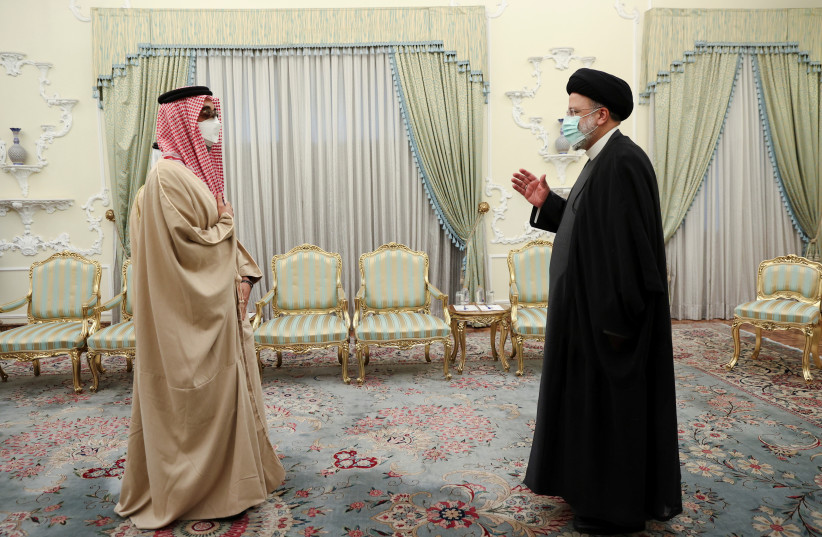As Iraq’s parliament finally gets moving on establishing a new government, and Iran hosts a delegation from Afghanistan, it is clear that Tehran is seeking to achieve multiple foreign-policy goals in the coming months.
This means it is hoping to shore up security in Afghanistan and Iraq, while expanding its influence across the Middle East. It has many challenges, including the Vienna talks with the West, but it is confident.
Evidence of this confidence was a wide-ranging talk with Iranian Foreign Ministry spokesman Saeed Khatibzadeh that was broadcast to local media.
What are some of the major files Iran is now working on? Buried in the discussion were hints of increasing talks with China. Iran already has a 25-year cooperation agreement with China and wants to cement it with concrete items on the agenda. Iran is sending its foreign minister to China this week.
“The senior Iranian diplomat also mentioned the 25-year Iran-China agreement and operational measures in the field of oil and gas,” Iranian media reported. “[Foreign Minister] Amir Abdullahian is going to China this weekend at the invitation of his Chinese counterpart and we have various issues on the agenda, and a 25-year road map is one of them… Our agenda is very diverse, and a variety of topics are being pursued in this context.”

Next, China is also focusing on Russia. Iranian President Ebrahim Raisi is supposed to visit Russia and is believed to be set to discuss defense agreements with Moscow. Raisi is expected to sign a 20-year, $10 billion security and defense cooperation agreement, according to media reports. This could lead to aerospace purchases and other items. Iran also wants new jets and technology.
Regarding Raisi’s visit to Moscow, the Iranian Foreign Ministry said there would be talks on further cooperation.
“Iran-Russia relations are based on good neighborliness and are convergent and close, and these convergences have been translated into various actions and perspectives,” it said. This includes Russia’s support for Iran at the Vienna talks. Russia has hinted at progress in those talks.
After China and Russia, both rising powers that are confronting the US, Iran is also courting Saudi Arabia with the fifth round of talks to heal ties with it. Iraq has played a role in these talks. Riyadh enabled Iran’s ambassador to the Houthis in Yemen to be evacuated last month, for instance.
“The next round of talks with Saudi Arabia, hosted by Iraq, is on the agenda,” Khatibzadeh said. “As soon as the information was finalized, I was shocked. On issues between us and Saudi Arabia, we tried to continue the talks, despite all the disputes in the mutual interest and the region, by distancing ourselves at points of disagreement on the basis of explicitness, and at the same time trying to establish stable relations between the two countries.”
Iran is also conducting talks with Turkey. According to media reports, Iran is paying close attention to Turkish Foreign Minister Mevlut Cavusoglu’s comments on a “tripartite corridor.”
The region "is tired of unhealthy competition and war and bloodshed, many of which are imposed by foreign interference… We welcomed bilateral and even trilateral and quadrilateral talks and tried to be one of their pillars,” Khatibzadeh said. “Ideas and initiatives are being explored, one of which is being pursued.”
The new talks include a transit agreement with Iran, Turkey and the UAE, Iran’s Tasnim News Agency reported.
“That is forming a happy dynamism in this region,” Khatibzadeh said.
Iran is also conducting new dialogue with Turkmenistan and Venezuela, he said, adding: “Tehran is a place for diplomatic talks, and delegations from Iran went to different countries and hosted various delegations, and the visit of the president of Turkmenistan is on the agenda. The preliminary trip of their delegation has been done and will be done soon, and [Venezuelan President Nicolás] Maduro’s trip is also on the agenda, and I will announce its date soon.”
In addition, Iran is closely watching the recent violence in Kazakhstan and calling for an inclusive government in Afghanistan. Tehran does not want to see persecution of Shi’ites in Afghanistan, for instance. The Foreign Ministry said it wants to see an Afghan government that is stable and provides peace in Afghanistan in the future.
“Iran will do its best to make Afghanistan’s future different from today, within the framework of good neighborly policy and kinship relations with the Afghan people,” Khatibzadeh said.
Meanwhile, Iran said it was looking to make progress in talks with South Korea. South Korea sent a representative to the Vienna talks recently, according to Iranian media reports. Tehran said South Korea should release frozen Iranian assets.
The context of the extensive Iranian diplomatic activity is that Iran has a lot on its agenda. It wants to increase ties with Russia and China, which it sees as rising powers that will replace the US. At the same time it wants to repair ties with Saudi Arabia and work with the UAE and Turkey.
It is also eyeing the Vienna talks and trips to Oman to secure its finances, as well as looking to secure its borders by expanding influence into Iraq and Afghanistan.
